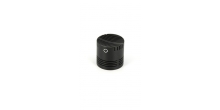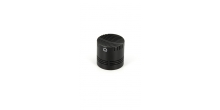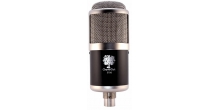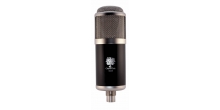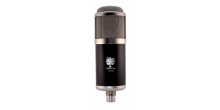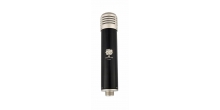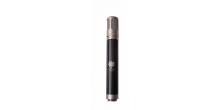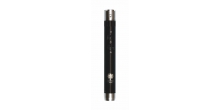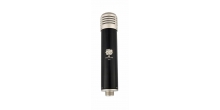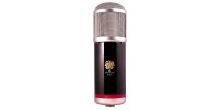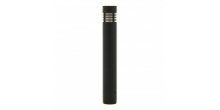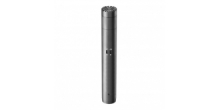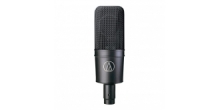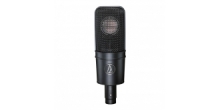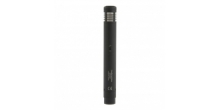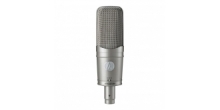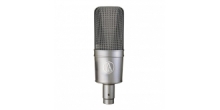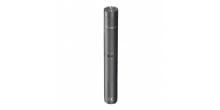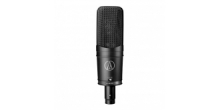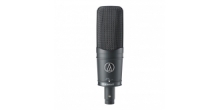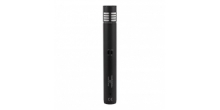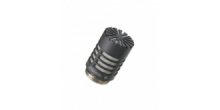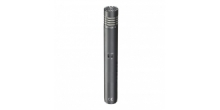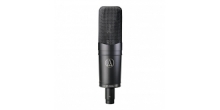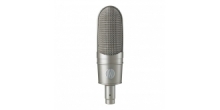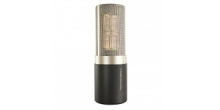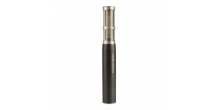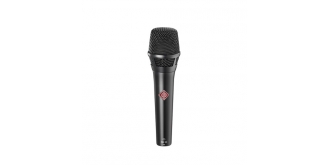 Agrandir l'image
Agrandir l'image
| Acoustical operating principle | Pressure gradient transducer |
| Directional pattern | Cardioid/cardioid/supercardioid |
| Frequency range | 20 Hz ... 20 kHz |
| Sensitivity at 1 kHz into 1 kohm | 4.5 mV/Pa |
| Rated impedance | 50 ohms |
| Rated load impedance | 1 kohms |
| Equivalent noise level, CCIR1) | 28 dB |
| Equivalent noise level, A-weighted1) | 18 dB-A |
| Signal-to-noise ratio, CCIR1) (rel. 94 dB SPL) | 66 dB |
| Signal-to-noise ratio, A-weighted1) (rel. 94 dB SPL) | 76 dB |
| Maximum SPL for THD 0.5%2) | 150 dB |
| Maximum output voltage | 12 dBu |
| Supply voltage (P48, IEC 1938) | 48 V ± 4 V |
| Current consumption (P48, IEC 1938) | 3.5 mA |
| Matching connector | XLR3F |
| Weight | approx. 300 g |
| Diameter | 48 mm |
| Length | 180 mm |
NEUMAN032T
Nouveau
Neumann - KMS 104

The KMS 104/104 plus and the KMS 105 microphones have been developed to optimally transmit the human voice with respect to the demanding conditions present on the live stage.
The KMS series has become the internationally acknowledged standard for first-class stage microphones.
The high acoustic resolution and smooth frequency response of the microphones ensure that the musician has optimal control of the stage performance at all times.
Especially due to their low self-noise and crosstalk behavior which is free of coloration, the KMS microphones are ideal for use with in-ear monitoring systems.
The KMS 104 and the KMS 104 plus have a condenser microphone capsule with a cardioid directional characteristic which provides the best possible suppression of sounds originating from behind the microphone. In contrast, with its supercardioid characteristic the KMS 105 is particularly good at suppressing sounds originating from the entire 180° hemisphere behind the microphone. The KMS 104 plus features, compared to KMS 104, a more extended bass frequency response. In close cooperation with professional musicians, with the aid of extensive practical tests, the KMS 104 plus has been especially optimized for the requirements of female voices in the rock and pop field.
The user can thus select the version that is optimally suited to the specific application.
Acoustic features
The studio condenser capsules used in the microphone versions provide the basis for transmitting all the nuances of the human voice. In comparison with other handheld microphones, which operate mostly with dynamic capsules, the KMS series has a particularly high acoustic transparency, a wide frequency range and a fine resolution of transients.
In KMS microphones, carefully adjusted acoustic filters and transformerless impedance converters that can handle very high sound pressure levels prevent the microphones from being overloaded even by strong plosive sounds.
In spite of excellent pop protection, sibilants and “S” sounds are transmitted with their natural accentuation, as is possible only with condenser microphones. Furthermore, the above-mentioned acoustic filters are designed so that the distinctive directional characteristics of the capsules are preserved even in the bass range. The filters thus ensure a very high level of feedback protection for the KMS 104/104 plus and KMS 105 vocal microphones when they are used with a stage sound system.
Electrical features
Since vocal microphones are typically addressed at close range, for the bass frequency response of the microphones, electronic compensation is used for the proximity effect in the respective capsules.
In addition, the microphone has an invariable, built-in high-pass filter with a cutoff frequency of 120 Hz (–3 dB, measured in a free sound field). The maximum sound pressure level of the KMS microphones is 150 dB.
The low self-noise level of only 18 dB A permits the microphones to be used at high gain levels without the risk of additional noise. Even at large distances, the microphones thus operate with a high signal-to-noise ratio, facilitating the freedom of movement and creativity that are important to the artist.
Due to the transformerless output circuit, the microphone signals can be transmitted even through long cables without loss of sound.
Mechanical features
Microphones designed for use on stage require a particularly robust construction. The KMS 104/104 plus and KMS 105 therefore have thick-walled metal housings, which also provide effective protection against handling noise.
The microphone headgrilles are made of hardened steel. If required, they can easily be unscrewed to permit cleaning of the interior acoustic filters.
Delivery Range
The KMS 104/104 plus and KMS 105 microphones, with a matching stand clamp, are supplied in an attractive padded nylon bag that is sufficiently durable for touring.
Features And Specs
| Acoustical operating principle | Pressure gradient transducer |
| Directional pattern | Cardioid/cardioid/supercardioid |
| Frequency range | 20 Hz ... 20 kHz |
| Sensitivity at 1 kHz into 1 kohm | 4.5 mV/Pa |
| Rated impedance | 50 ohms |
| Rated load impedance | 1 kohms |
| Equivalent noise level, CCIR1) | 28 dB |
| Equivalent noise level, A-weighted1) | 18 dB-A |
| Signal-to-noise ratio, CCIR1) (rel. 94 dB SPL) | 66 dB |
| Signal-to-noise ratio, A-weighted1) (rel. 94 dB SPL) | 76 dB |
| Maximum SPL for THD 0.5%2) | 150 dB |
| Maximum output voltage | 12 dBu |
| Supply voltage (P48, IEC 1938) | 48 V ± 4 V |
| Current consumption (P48, IEC 1938) | 3.5 mA |
| Matching connector | XLR3F |
| Weight | approx. 300 g |
| Diameter | 48 mm |
| Length | 180 mm |




